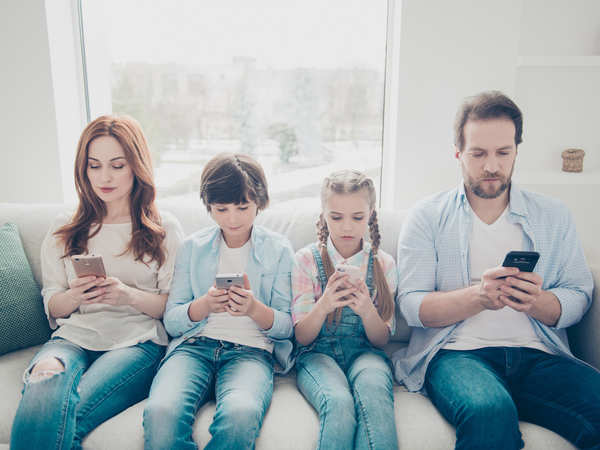January 18, 2023
Your Presence Is the Best Gift They Will Ever Receive
The invention of the smart phone was one of the greatest accomplishments of the 20th century, it was also in the opinion of some to be the most tragic thing to happen to human social behavior norms. Clearly, cell phone addiction is a thing. Research done in 2019 by Asurion found that on average, Americans check their phones 96 times a day, or every 10 minutes (1). A follow-up survey was done by the same company in 2022 and found that the number increased nearly four-fold to 352 times a day (2). Despite multiple warnings from research, American society is more obsessed than ever with their mobile phones.
I won’t argue the usefulness. Cell phones keep us connected to our email, our social platforms, the internet, maps and driving directions, and we can even use cell phones to order delivery of food and other goods. I am one of those who own a smart phone, a smart watch that is connected to my phone and stay connected throughout the day. The communication is vital in my business and home life.
But for the sake of the research, lets discuss the adverse psychological traits that I see on a daily in my social interactions. Go to any restaurant or social setting, and you can see whole families or groups of friends on their phones. No conversation at all, just quiet scrolling. Or you may see one person patiently waiting for a person to stop scrolling so they can continue a conversation. I wonder, how is it that we in humanity have reached the epitome of instant communication and yet we have become so inept in in-person social skills? In 2012, a campaign for just this social phenomena was launched to combat “phubbing”, a term to describe the act of snubbing someone you’re talking with in person in favor of your phone.
Techopedia released an article on the coined phrase in 2014, stating
…humans are adapting to new technology in a very different kind of social world that is more and more digitized and less and less connected to the physical… (3)
Phubbing can include any of these behaviors:
- Glancing at your phone repeatedly during an in person conversation, causing a stall in the communication.
- Interrupting a real-life conversation to answer your phone for a nonemergency call.
- Scrolling through social media feeds, ignoring the speaker.

The effects of phubbing are well documented now, as studies and research has been done linking phubbing to represent a barrier in communication, causing conflict and lowering relationship satisfaction in a romantic context (4).
Another study found that this created a domino effect indirectly increasing the risk of depression. The study was comprised of two hundred and forty-three married adults, and the results indicated that phubbing had a negative effect on relationship satisfaction, and that resulting drop of relationship satisfaction had a negative effect on depression (5).

The truth of the matter is, when someone chooses to phub you in person during a social setting, it can lead to feelings of being rejected, excluded and this can absolutely have an impact on your mental health.
We can agree that most of us need to practice better in person social skills.
Ironically, when people are phubbed, they react by using their phones more (6). Specifically, they tend to use social media more, according to a 2017 study by James A. Roberts, PhD and Meredith E. David, PhD. This leads to a reduction in satisfaction for both parties in the social setting.
So how can we practice presence?
As frivolous as it sounds, before you go off to your social event, you must first take care of you. Its hard to socialize with someone who is overwhelmed or exhausted, let alone preoccupied on their smartphone. In order to give your presence, you must have that balance.
When we have balance, we can relax and notice all the little things. When we are not distracted, we can pick up on social cues that we should be noticing. Show compassion when needed, show support when needed.
Everyone wants to be seen and heard. We can do this if we fully listen. Give the speaker your full attention. Accept that the speaker may be depressed, or be struggling with anxiety, they may be in pain, or grieving. Not all conversations can be positive. Give your speaker your gift of true friendship while giving them the gift of your presence.
While we are being in the moment, understand that the internet is forever. But the speaker in front of you is not. This moment, right now, is it. Make the most of it.
Finally, after your social interaction, reflect on what you could have done to make the experience better.
The best gift you can give really is “Presence”. Your attention to the speaker helps them understand that you have truly made them a priority to you. When you do this, your enriching the experience for all.
The most precious gift we can offer others is our presence. When mindfulness embraces those we love, they will bloom like flowers.
Thich Nhat Hanh–
References:
- https://www.prnewswire.com/news-releases/americans-check-their-phones-96-times-a-day-300962643.html
- https://www.asurion.com/connect/news/tech-usage/
- https://www.techopedia.com/definition/29613/phubbing
- https://aisel.aisnet.org/ecis2016_rp/109/
- https://www.researchgate.net/publication/312382860
- https://www.baylor.edu/business/kellercenter/news.php?action=story&story=175657

